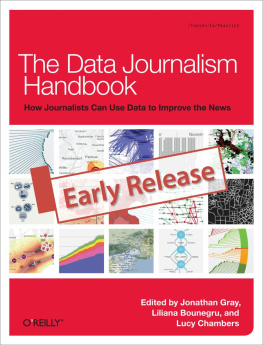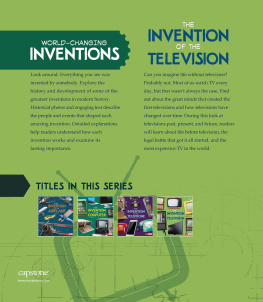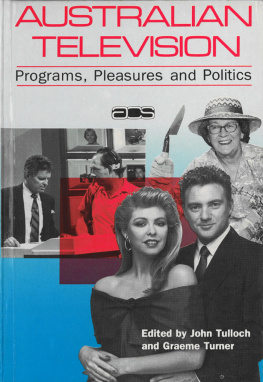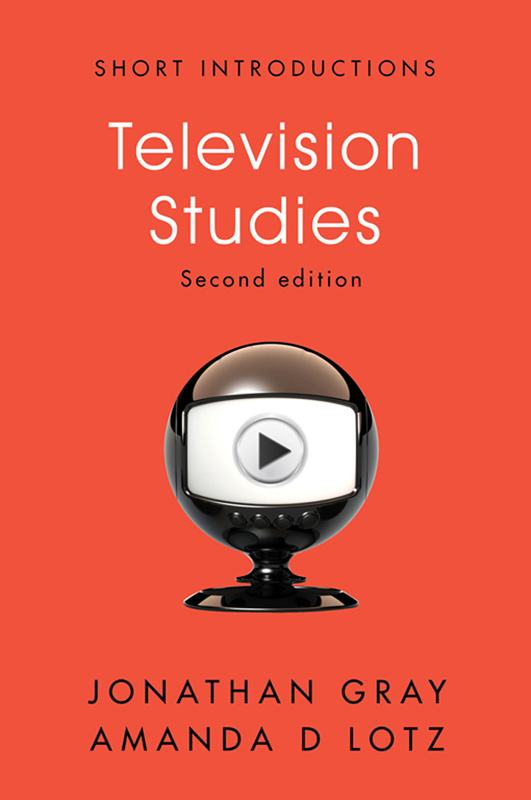Table of Contents
Guide
Pages
SHORT INTRODUCTIONS
Nicholas Abercrombie, Sociology
Michael Bury, Health and Illness
Raewyn Connell and Rebecca Pearse, Gender 3rd edition
Hartley Dean, Social Policy 3rd edition
Lena Dominelli, Introducing Social Work
Jonathan Gray and Amanda D. Lotz, Television Studies 2nd edition
Jeffrey Haynes, Development Studies
Stuart Henry, with Lindsay M. Howard, Social Deviance 2nd edition
Stephanie Lawson, International Relations 3rd edition
Ronald L. Mize, Latina/o Studies
Chris Rojek, Cultural Studies
Mary Romero, Introducing Intersectionality
Karen Wells, Childhood Studies
Television Studies
Second Edition
Jonathan Gray and Amanda D. Lotz
polity
Copyright Jonathan Gray and Amanda D. Lotz 2019
The right of Jonathan Gray and Amanda D. Lotz to be identified as Authors of this Work has been asserted in accordance with the UK Copyright, Designs and Patents Act 1988.
First edition published in 2011 by Polity Press
This second edition first published in 2019 by Polity Press
Polity Press
65 Bridge Street
Cambridge CB2 1UR, UK
Polity Press
101 Station Landing, Suite 300
Medford, MA 02155, USA
All rights reserved. Except for the quotation of short passages for the purpose of criticism and review, no part of this publication may be reproduced, stored in a retrieval system or transmitted, in any form or by any means, electronic, mechanical, photocopying, recording or otherwise, without the prior permission of the publisher.
ISBN-13: 978-1-5095-3179-0
ISBN-13: 978-1-5095-3181-3 (pb)
A catalogue record for this book is available from the British Library.
Library of Congress Cataloging-in-Publication Data
Names: Gray, Jonathan (Jonathan Alan), author. | Lotz, Amanda D., 1974- author.
Title: Television studies / Jonathan Gray, Amanda D. Lotz.
Description: Cambridge, UK ; Medford, MA : Polity, 2018. | Series: Short introductions | Includes bibliographical references and index.
Identifiers: LCCN 2018022730 (print) | LCCN 2018033649 (ebook) | ISBN 9781509531820 (Epub) | ISBN 9781509531790 | ISBN 9781509531790q(hardback) | ISBN 9781509531813q(paperback)
Subjects: LCSH: Television broadcastingHistory and criticismHistory.
Classification: LCC PN1992.45 (ebook) | LCC PN1992.5 .G68 2018 (print) | DDC 791.45071dc23
LC record available at https://lccn.loc.gov/2018022730
Typeset in 10 on 12 pt Sabon
by Toppan Best-set Premedia Limited
Printed and bound in Great Britain by CPI Group (UK) Ltd, Croydon
The publisher has used its best endeavours to ensure that the URLs for external websites referred to in this book are correct and active at the time of going to press. However, the publisher has no responsibility for the websites and can make no guarantee that a site will remain live or that the content is or will remain appropriate.
Every effort has been made to trace all copyright holders, but if any have been inadvertently overlooked the publisher will be pleased to include any necessary credits in any subsequent reprint or edition.
For further information on Polity, visit our website: politybooks.com
Acknowledgments
In doling out thanks, it may seem odd to start by thanking those who have made the writing of this book all the harder a task, but we nevertheless wish to thank all of our many peers and forerunners for making television studies something that is so vibrant, interesting, challenging, diverse, and nuanced that putting it in a short book could never have been and never will be a simple task, for us or for others.
More specifically, we extend heartfelt thanks to some of the field's pioneers and shining lights who at various times walked us through moments in television studies history: Charlotte Brunsdon, John Fiske, Christine Geraghty, Bruce Gronbeck, John Hartley, Henry Jenkins, David Morley, Horace Newcomb, Paddy Scannell, Ellen Seiter, and Lynn Spigel.
Other colleagues and friends who pushed us in helpful directions with criticism and friendly advice include Rob Asen, David Bordwell, Joshua Green, Matt Hills, Michele Hilmes, Derek Johnson, Lori Kido Lopez, Jeremy Morris, Sarah Murray, Aswin Punathambekar, and Serra Tinic. Many thanks, too, to Polity's reviewers for both editions.
Finally, we'd like to thank those who played the biggest roles in introducing each of us to television studies: Horace Newcomb in the case of Amanda, and Nick Couldry and David Morley in the case of Jonathan. We're proud to call these gracious, warm, and brilliant teacher-scholars our mentors and friends. The field has gained so much from their work, but so have we as individuals. We dedicate the book to them, with thanks.
Introduction: Still Television Studies?
Lately, keeping up with television has become hard work. The number of shows one wants to watch or is told one must watch regularly require far more hours than any of us have to spare. And yet not only are new programs constantly appearing, and old ones returning to vie for their own share of our attention, but new sources for television and new ways to watch seem also to be proliferating at pace. Amidst this torrent of new and old television, television studies has similarly been working hard to keep up, to adapt to the shifting televisual environments, and to make sense of them on the fly. Indeed, the subfield of television studies has expanded and transformed considerably in the last decade, not only because television as an object of study has experienced such dynamic transition, but also because of shifts in the relationships among television studies and related subfields.
And in recent years, Netflix has endeavored to become a new kind of global television service.
We remain in the early stages of change introduced by internet-distributed television, which has notably been a two-pronged adjustment. First, it has created entirely new sectors of the television industry about which there is much to learn. Secondly, the arrival of internet-distributed television has altered the ecosystem for all forms of television distribution. As a result, many things we once knew about television that derived from being able to access it only by broadcast signal or cable/satellite connection also must be revisited. The change introduced by internet distribution may not be an emergent future that replaces the past, but a widening of the range of practices and technologies television encompasses. Our understandings thus must incorporate these new developments, but also remain cognizant of the previous organizations and structures that persist.
Not only have the technologies and business practices of television changed. With them, the felt experience of engaging with television has also shifted, profoundly for some. Streaming services Netflix alone reached 117 million worldwide at the end of 2017 provide access to significant catalogues of television past and present, and how we watch those shows adjusts our experience of television in both subtle and profound ways. When entire seasons drop on one day, fan discussions and cultures shift from an era in which each week brought a lone episode. Viewers around the world could near-simultaneously mainline and burn through an entire season of Stranger Things within a few days of release, then share in the same social media conversations about it. And yet these new practices are not replacements: most viewing remains episode-a-week screening. In fact, all of the pre-internet ways of viewing, types of programs, and television businesses persist, so that despite our chronicle of change, the story of contemporary television is not one of the transition from one norm to another so much as the development of a multiplicity of norms, all of which have substantially eroded the uniformity long perceived characteristic of television viewing culture.






